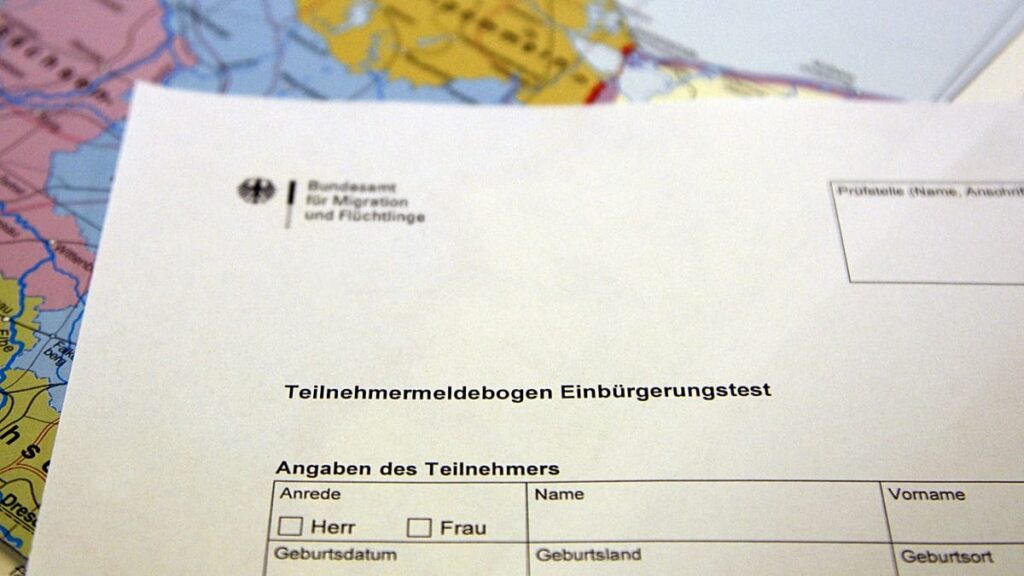A series of online claims alleged that Germany has sped up its processes for foreigners to naturalise as German citizens.
For example, a clip recently resurfaced of the far-right Alternative for Germany (AfD)’s Alice Weidel speaking to public broadcaster ARD in July, in which she claims foreigners in Germany are “turbo-naturalising”.
“Turbo-naturalisation with just a mouse click, you don'”t even need to know German anymore. Is that politics for our country? I don’t think so,” Weidel says in the video, pointing to a quota set by Berlin’s Regional Immigration Office to complete 40,000 naturalisation cases in 2025.
Elsewhere, prominent German rapper Capital Bra caused a stir when he claimed that he had a newfound sympathy for the AfD. When explaining why, the Ukrainian-raised musician said he was being refused a German passport before claiming, “Suddenly people come here, live here for a month, and they get a German passport.”
‘Turbo-naturalisation’?
Most misleading claims surrounding Germany’s naturalisation process stem from the former government’s decision to reform its laws on the process of becoming a German citizen.
In 2024, legislation passed under the three-party coalition of the Social Democrats (SPD), the Greens and the Free Democratic Party (FDP) allowed foreigners in Germany to acquire a German passport without giving up their previous citizenship, and shortening the residency requirement from eight to five years.
Germany previously didn’t allow dual citizenship for non-EU nationals, meaning foreigners who wanted to become German had to forgo their previous nationality, except in special cases.
However, contrary to claims, strict rules apply to the process: foreigners must have lived legally in Germany for five years, possess permanent residency, prove they can financially support themselves and pass a B1 language and naturalisation test.
They must also have a clear criminal record, declare their commitment to Germany’s democratic basic order and acknowledge Germany’s responsibility for crimes committed by the Nazis and commit to the protection of Jewish life.
Also in 2024, the government introduced a “fast-track” option for foreigners who were exceptionally well integrated. These foreigners can become German citizens after only three years of living in Germany if they possess strong German language skills at a C1 level or above and demonstrate an above-average performance in work, school, or voluntary work, alongside all the other requirements.
This “fast-track” or “turbo-naturalisation” was abolished in October 2025 through a Bundestag vote under the Christian Democratic Union (CDU) and the SPD coalition, meaning the claims Weidel makes in the clip are outdated.
Regardless, few foreigners living in Germany ever used the so-called fast track: data from the German Statistics Office shows only 7% of all naturalisations used this route in 2024.
Is there a quota for naturalisations?
One of Weidel’s claims about a target for 40,000 naturalisations set by Berlin’s Immigration Office (LEA) is indeed true.
In January this year, Berlin’s Interior Senator Iris Spranger announced the state had exceeded its previous year’s target of 20,000 and set the high goal for the next year.
Weidel’s claim, however, lacks some context. In January 2024, all naturalisations in Berlin were centralised to be handled by one office. Previously, naturalisation applications were processed by the offices of Berlin’s 12 districts.
These offices had accumulated a backlog of around 40,000 unprocessed cases. So, part of the reason for these high targets set by the office was clearing the backlog of cases that had accumulated and not, as Weidel suggested, due to a lack of regulation around processing German passports for foreigners.
According to the LEA, the office also finished digitalising its systems by mid-2024, allowing it to speed up the process significantly, explaining the large increase in processed applications by the end of 2024, and the projected increase in 2025.
However, it is true overall that the number of people receiving German citizenship has increased in recent years. Germany granted more than 290,000 citizenships last year, a large increase of 46% from the year before.
At least part of this uptick was attributed to the number of Syrians who became eligible for naturalisation in 2023 or 2024. The majority of Syrians in Germany arrived as refugees in 2015 and 2016, and so would have met the former eight-year residency requirement in the past two years.
Can you get a German passport in one month?
Contrary to Capital Bra’s claim, you cannot get a German passport as a foreigner in one month.
Legally living in Germany for at least five years is a standard requirement for German citizenship.
Heidi Schairer, an immigration lawyer who specialises in naturalisations, told Euronews’ verification team The Cube that there is only one exception to the five-year requirement: spouses of German citizens can start the process after three years of residency, as long as they have been married to a German citizen for at least two of those years.
Elsewhere, in exceptional cases, someone may be able to justify speeding up the processing times of their applications, but these are far from the majority.
“For example, if someone from Poland wants to join the German national [football] team and the World Cup or European Championship is in half a year, that is a valid reason,” Schairer said.
“Another example: someone who is about to become a civil servant. Some rules for civil servants become more restrictive next year, many want to be naturalised quickly so they can be appointed,” she said. “That is also a reason for acceleration.”
It is also possible for people living abroad who are descendants of German nationals to apply for citizenship, but this process follows separate rules and still does not allow naturalisation in one month.
For the vast majority of foreigners wanting to apply, the five-year residency requirements and subsequent waiting times for processing are applicable.
Read the full article here

















